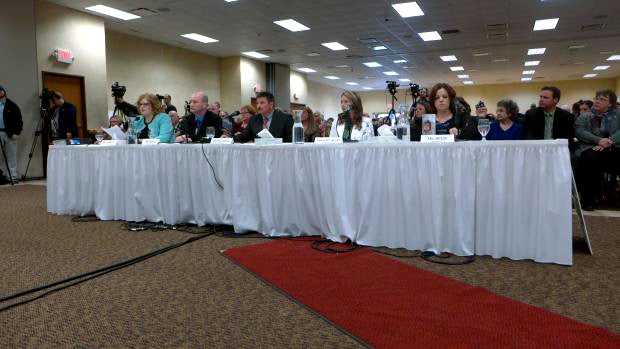As federal and state agencies look into over-prescription of painkillers at the Tomah VA Medical Center, investigations also center on whether staff members were punished for raising concerns about narcotics. Now, VA officials and lawmakers are taking steps to end what’s been called a culture of fear and intimidation in the VA.
One of Dr. Noelle Johnson’s first jobs as a pharmacist was at the Tomah VA. Soon after she started, she began refusing to fill a number of prescriptions she considered unsafe and illegal.
Dosages vary by patient, but Johnson shares one example for a morphine prescription that raised a red flag.
Stay informed on the latest news
Sign up for WPR’s email newsletter.
“A common dosage prescribed would be things like 15 milligrams, twice daily, quantity 60,” she said. “I received a prescription for 1,080 immediate release morphine tablets for a 30-day supply. That equates to over 700 milligrams per day.”
Johnson said many of the questionable prescriptions came from the Tomah VA’s former chief of staff, Dr. David Houlihan. She said they would often disagree about a patient’s regimen.
“He got in my face and screamed profanities at me and went down to my chief and said, ‘You will discipline her for questioning me,’” Johnson said. “Eventually it led to my termination. I met with the DEA in 2009 and two weeks later I was fired.”
Johnson believes she lost her job for filing a whistleblower complaint.
According to Houlihan’s lawyer, the doctor is not able to conduct interviews at this time.
Johnson, along with another Tomah VA whistleblower, Ryan Honl, testified before lawmakers at a recent Congressional hearing in Tomah. It focused on prescription practices and retaliation at the hospital.
Honl said there was a backlash after he refused to falsify records, and contends that the culture of fear led to poor care and even deaths.
“The results were to the detriment of the health of veterans and in some cases, the deaths of veterans,” Honl said. “The system was slow to respond, but quick to silence those who raised concerns. I just wish the whistle I blew would resurrect those who have died due to the mistreatment.”
A report issued by the VA in March found that “an apparent culture of fear at the facility compromised patient care and impacted staff satisfaction and morale.” More thorough investigations are underway.
Top leaders in the VA now seem to be coming down on the issue, saying retaliation will not be tolerated.
Dr. Carolyn Clancy is the VA’s interim undersecretary for health. She said whistleblowers should be commended and employees should be open to criticism.
“If someone tells us very specifically — whether that’s an employee, a patient, a family member — ‘You could have done better,’ or, ‘My family member would have done better if you would have done this,’ that’s the only way we get better, and I don’t think we have celebrated that enough,” she said.
Clancy said some VA facilities are doing well and reward feedback. On the other hand, other VA hospitals are under investigation for creating a retaliatory culture, similar to Tomah.
Groups have been meeting regularly at the Tomah VA to boost staff morale and improve communication.
Multiple bills have been introduced in Congress that would strengthen whistleblower protections within the VA and punish those who retaliate. So far, no Wisconsin lawmakers have signed on as cosponsors.
Tomah VA registered nurse and union president Lin Ellinghuysen said she’s skeptical about laws being strengthened to protect whistleblowers. She said people at all levels in the VA need to be held accountable for their actions, otherwise a bill is useless. But, she said these bills and the recent congressional hearing are a step in the right direction.
“Our representatives from D.C. are here and we matter. I think they’re going to do the right thing,” she said. “I think months from now there will be some recovery at our medical center.”
Ellinghuysen said that means whistleblowers, like pharmacist Dr. Noelle Johnson and Ryan Honl, never have to worry about losing their jobs again.
Wisconsin Public Radio, © Copyright 2024, Board of Regents of the University of Wisconsin System and Wisconsin Educational Communications Board.



